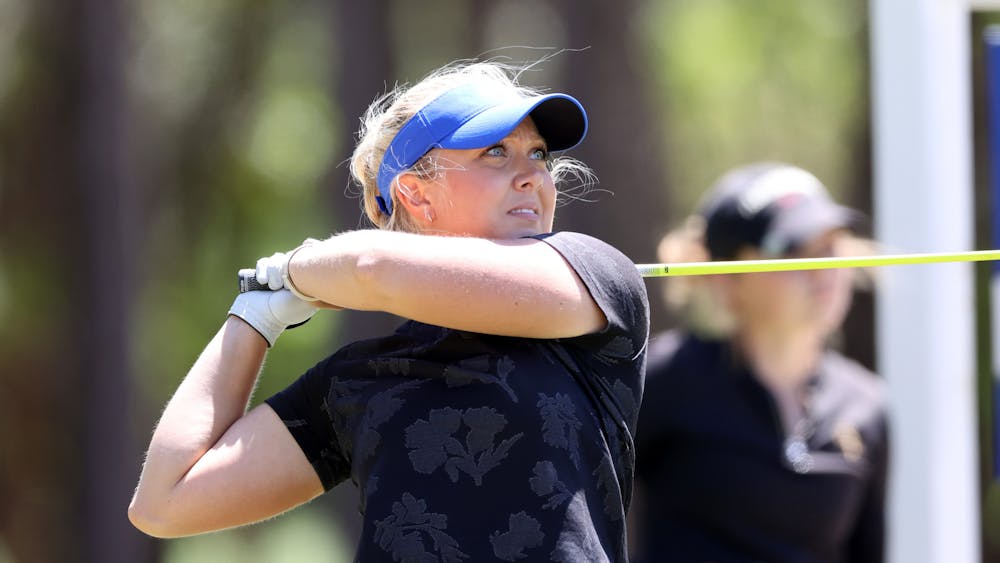Golf, and life, rarely embark on a smooth path.
Going into NCAA Regionals, which begin Friday at Vanderbilt Legends Club in Franklin, Tenn., Duke is the No. 4 seed and right in the mix for one of the four tickets to the NCAA Championship in Scottsdale, Ariz.
A major reason for that is Erica Shepherd, Duke’s most accomplished and consistent player. Dating back to the fall, the Indiana native has finished in the top five in half of her eight stroke-play starts.
Based on that recent track record, Shepherd appears to fit the recent mold of Blue Devil number ones, a mantle that has been held in recent years by the likes of ACC individual medalist Gina Kim, first-team All-American Ana Belac and two-time ANNIKA National Player of the Year Leona Maguire.
But it took the left-handed junior, despite her status as an elite ball-striker with a stoic demeanor and two USGA titles, time and reps to settle into the role of top dog for a seven-time title-winning program.
“It took some getting used to, but I think the team, every single person has stepped up and done what they need to do to adjust to the change,” Shepherd said in an interview with The Chronicle.
Clearly, the two-time All-ACC selection is ready for her second postseason run. But how did Shepherd get to this point?
‘Turning point’
Every young, emerging golfer, even future superstars such as Rory McIlroy and Lydia Ko, has a breakthrough moment.
For Shepherd, winning the 2017 US Girls' Junior Championship at the age of 16 was that moment.
“That was definitely a turning point in my golf career because of how big of a win it was, but also just what I proved to myself that day,” Shepherd said.
Not only did she prove to herself that she could close out a grueling test of skill and resolve, but she also proved that she could deal with some serious adversity along the way.
The day before her 3&2 win against Jennifer Chang in the final, the lefty was in the midst of controversy surrounding how her 19-hole semifinal win against Elizabeth Moon ended.
With Moon facing a four-foot putt to advance on the 19th green, it appeared that Shepherd might have her championship hopes dashed.
But Moon yanked her putt left and quickly raked her ball before Shepherd could concede the short comebacker.
That constituted a violation of Rule 18-2, and the Indiana native was declared the winner as Moon incurred a one-shot penalty. Shepherd advanced, but not without backlash.
Most of the blame should have gone to the rules official and the archaic nature of the rulebook, but Shepherd bore a large share of it at the time from observers. It rattled her, with Shepherd saying, “I did not think I’d be able to play golf that day,” in reference to the next day's final.
But just 24 hours after that controversial finish, Shepherd kept attacking pins, rolled in crucial putts and left no doubt in her 34-hole victory.
“Proving to myself that I can go above whatever people are saying,” Shepherd said on what that win meant to her psyche. “In the moment it felt like the end of the world, but looking back it was definitely a really good opportunity.”
Fast forward a little more than two years and Shepherd was starting out at Duke, mere months after the program won its seventh national title.
‘Took me a while’
As a freshman in the fall of 2019, Shepherd was on the heels of winning the US Women’s Amateur Four-Ball Championship the previous May in tandem with Duke teammate Megan Furtney.
But the adjustment to college golf, and college life, was a shock to her system.
“I had some friends go on to college golf from junior golf, and do really well,” Shepherd said. “But as soon as I got to Duke and started playing with everyone, I was like, ‘Wow, I'm not that good.’"
Once she adjusted to college time commitments and found her place within the ultra-talented Duke lineup—the Blue Devils returned Belac, Kim, Miranda Wang and Jaravee Boonchant from the previous May’s title-winning lineup—Shepherd showed signs of why she was a preseason Golfweek Third Team All-American.
She tied for sixth at the prestigious East Lake Cup and went 2-0 in match play despite Duke losing to Auburn and Arizona.
That result was part of a difficult process to establish herself at the college level, a process that Shepherd says took “at least a whole semester.”
“I was like, ‘Wow, I'm grinding but I'm not getting better,’” Shepherd said. “I kind of woke myself up once I realized I was sleep-deprived and not playing good golf. It took me a while to get there though.”
“She probably felt like she was underachieving a little bit as a freshman, but I don't see it that way. I see it as everybody's on their own journey,” head coach Dan Brooks said, putting Shepherd’s first year into perspective.
Even through two spring tournaments, East Lake still marked the only top-10 finish of Shepherd’s debut campaign. Then the pandemic hit, and Duke did not compete in the fall of 2020, leaving Shepherd and her teammates to piece together individual schedules.
Returning to collegiate action in February 2021, she was primed to kick her career as a Blue Devil into gear. A third-place finish at the Palmetto Intercollegiate despite knee surgery in November, her first collegiate win in March and a tie for eighth at ACCs proved that Shepherd could make it happen with consistency.
“I was just overwhelmed with emotion,” Shepherd said after that initial victory, a sign that it was a long time coming.
Finally getting a shot at the postseason, Shepherd finished tied for 36th at the NCAA Championship and was named a second-team All-American. She had arrived on the college golf scene.
Junior year looked certain to be an emphatic statement—but again, nothing in golf is perfectly linear.
‘Finding a balance’
Shepherd’s junior season was already going to be different, considering that four-time All-American Jaravee Boonchant began her professional career after NCAAs came to a close in May 2021.
That void had to be filled, and the common assumption was that Shepherd, along with sophomores Anne Chen and Phoebe Brinker, would improve enough to fill it.
But then Kim turned pro in January, just more than a month before the spring season began.
The program had been quietly preparing for Kim’s departure, as the Chapel Hill native went through qualifying school in the fall. However, it meant that Shepherd would have to excel if the Blue Devils were to contend in the ACC and national landscapes.
While she always anticipated becoming the number one at Duke, the two-time US Women’s Open participant mentioned that she “was expecting to assume this role next year.”
Her timeline speeding up, the added expectations that come with the role and her eventual desire to reach the LPGA made it an initially challenging spring.
“I kind of just got caught up in results and less on the process,” Shepherd said. “When you're trying too hard and want it too bad in golf, that's when it actually doesn't go your way. So it's actually just about finding a balance and enjoying the moment.”
Plus, Shepherd altered her ball flight over the last few months, opting for a straighter flight and “taking curve out of her shot,” according to Brooks. That change takes time to bring to the course, and add in some struggles on the greens this spring, her four spring regular-season events did not reach the standard she set in 2021.
As a whole, Shepherd said her game has been “up and down a little bit” since the season-opening Moon Golf Invitational in late February. Yet she kept going, kept fighting and kept searching for elusive perfection.
So much about golf is about that process that Shepherd referenced. Choosing the right club. Deciding whether to take five yards off an approach shot or not. Moving on from a bad break off the tee and getting out of jail from the rough.
In college, without a caddie to lean on, focusing on that process is a skill.
“You can hardly even control your golf game,” Shepherd said. “No matter how hard you try, you can't really guarantee a good score. So just trying to keep the energy good and keep the positive vibes going.”
Brooks echoed that sentiment, saying, “Anybody that's driven like that, has to be always learning to enjoy the process, and make sure that that's the main focus,” with respect to Shepherd’s primary objective in competition.
Her results over the last three or so months are a testament to the time it takes to dial in that process. Up until ACCs in mid-April, Shepherd’s best finish this spring was a joint 23rd at the Moon Golf Invitational. She missed the cut at the Augusta National Women’s Amateur, and said that she needed a “confidence booster”.
She got exactly that via a second-place finish behind Brinker in ACC stroke play. Shepherd got going over the final 36 holes, shooting 68 and 69 to vault up the leaderboard.
“Finally everything came together,” Shepherd said. “Obviously, you're gonna have strengths for a week, but it's a matter of having everything come together.”
Since that runner-up, Shepherd finished the school year and competed in sectional qualifying for the US Women’s Open in Columbus, Ohio. She finished six shots back of qualification, but still ended in a tie for 15th out of 63 participants, proof that she is still in form.
Going into Monday’s 9 a.m. tee time in Tennessee, Shepherd is No. 35 in the most recent World Amateur Golf Ranking. If Duke is to advance and make some noise out in the desert, it will need her to play to that ranking.
Considering the last five years, though, Shepherd is more than ready.
“Once you're kind of in balance and homeostasis, that's when everything finally comes together,” Shepherd said.
Get The Chronicle straight to your inbox
Signup for our weekly newsletter. Cancel at any time.

Max Rego is a Trinity senior and an associate sports editor for The Chronicle's 118th volume. He was previously sports managing editor for Volume 117.

